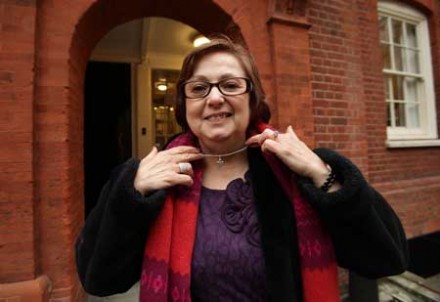
British Airways employee Nadia Eweida celebrates winning her case in London (Photo: PA)
The European Court of Human Rights has today given its judgment in the cases of four Britons who alleged they suffered discrimination as a result of their Christian faith.
Only one of the four was successful in their claims.
Nadia Eweida, a worker for British Airways, and Shirley Chaplin, an NHS nurse, both complained when their employers ordered them to cover up crosses worn around their necks.
Ms Eweida was initially told by BA that crosses were prohibited as they undermined the professional presentation of staff ? despite hijabs, turbans and skull caps being acceptable. BA subsequently changed their policy, and today she has won her case for discrimination.
Ms Chaplin, along with Lillian Ladele and Gary McFarlane, lost their appeals before a panel of seven judges.
Ms Ladele was a marriage registrar for Islington Borough Council who asked not to perform same-sex civil partnerships when these were introduced. She requested to do other work instead, but was told this was against the council?s equality and diversity policy. Mr McFarlane, a relationship counsellor for Relate, did not want to participate in sex therapy with homosexual couples. Both cited Christian teaching in defence of their objections.
All four are Christians who claim that their actions are aspects of their faith which are protected under Article 9 of the European Convention on Human Rights. This defends the right to ?manifest religion or belief, in worship, teaching, practice and observance?, subject to proportionate limitations, ?prescribed by law and necessary in a democratic society for the protection of the rights and freedoms of others?.
The three who lost their appeals are believed to be considering a final appeal to the Grand Chamber of the European Court, where their cases could be heard before seventeen judges.
John Duddington, editor of the Christian Law Review, said: ?I expected this. The decision of the UK courts that a Christian could be prevented from wearing a cross at work was plainly wrong and thank goodness that the European Court of Human Rights has seen sense here. However, the courts have a very poor record of upholding the rights of Christians when other rights are involved, such as those of homosexuals, and so the other decisions, although very disappointing, come as no surprise.
?All is not lost. however. The UK Government is looking at the whole area of human rights and now is the time for Christians ? and those of other faiths ? to make a strong case for the reasonable accommodation of religious beliefs to be protected in law.?
Source: http://www.catholicherald.co.uk/news/2013/01/15/european-court-rules-on-religious-freedom-cases/
numerology the game george lucas billy the kid neville neville new hampshire primary
No comments:
Post a Comment
Note: Only a member of this blog may post a comment.